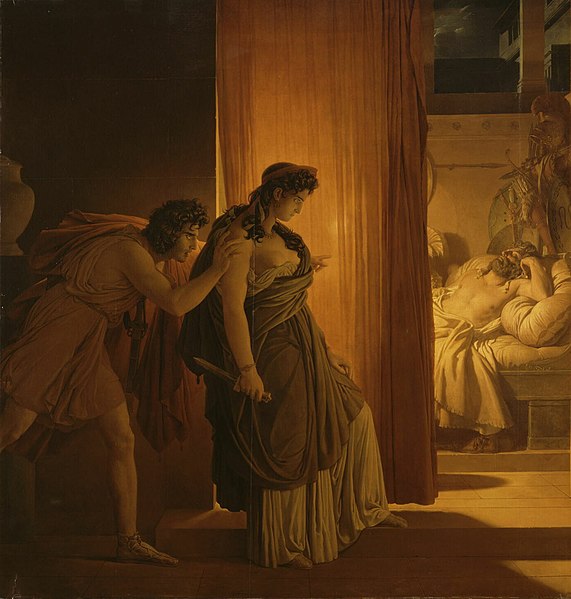In Greek mythology, Orestes or Orestis was the son of Clytemnestra and Agamemnon, and the brother of Electra. He is the subject of several Ancient Greek plays and of various myths connected with his madness and purification, which retain obscure threads of much older ones.
Orestes at Delphi flanked by Athena and Pylades among the Erinyes and priestesses of the oracle, perhaps including Pythia behind the tripod – Paestan red-figured bell-krater, c. 330 BC
Orestes and Iphigeneia on an antique mosaic, Musei Capitolini
Orestes, Elektra, and Pylades at the tomb of Agamemnon - Campanian red-figure hydria, c. 330 BC
Orestes Pursued by the Furies by William-Adolphe Bouguereau
Clytemnestra, in Greek mythology, was the wife of Agamemnon, king of Mycenae, and the half-sister of Helen of Troy. In Aeschylus' Oresteia, she murders Agamemnon – said by Euripides to be her second husband – and the Trojan princess Cassandra, whom Agamemnon had taken as a war prize following the sack of Troy; however, in Homer's Odyssey, her role in Agamemnon's death is unclear and her character is significantly more subdued.
Clytemnestra, John Collier, 1882
Clytemnestra trying to awake the Erinyes while her son is being purified by Apollo, Apulian red-figure krater, 480–470 BC, Louvre (Cp 710)
Murder of Agamemnon, painting by Pierre-Narcisse Guérin (1817)
Orestes Pursued by the Furies by William-Adolphe Bouguereau. Clytemnestra was killed by Orestes and the Furies torment him for this killing







